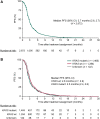Regorafenib for Patients with Metastatic Colorectal Cancer Who Progressed After Standard Therapy: Results of the Large, Single-Arm, Open-Label Phase IIIb CONSIGN Study
- PMID: 30190299
- PMCID: PMC6369948
- DOI: 10.1634/theoncologist.2018-0072
Regorafenib for Patients with Metastatic Colorectal Cancer Who Progressed After Standard Therapy: Results of the Large, Single-Arm, Open-Label Phase IIIb CONSIGN Study
Abstract
Background: In the phase III CORRECT trial, regorafenib significantly improved survival in treatment-refractory metastatic colorectal cancer (mCRC). The CONSIGN study was designed to further characterize regorafenib safety and allow patients access to regorafenib before market authorization.
Methods: This prospective, single-arm study enrolled patients in 25 countries at 186 sites. Patients with treatment-refractory mCRC and an Eastern Cooperative Oncology Group performance status (ECOG PS) ≤1 received regorafenib 160 mg once daily for the first 3 weeks of each 4-week cycle. The primary endpoint was safety. Progression-free survival (PFS) per investigator assessment was the only efficacy evaluation.
Results: In total, 2,872 patients were assigned to treatment and 2,864 were treated. Median age was 62 years, ECOG PS 0/1 was 47%/53%, and 74% had received at least three prior regimens for metastatic disease. Median treatment duration was three cycles. Treatment-emergent adverse events (TEAEs) led to dose reduction in 46% of patients. Regorafenib-related TEAEs led to treatment discontinuation in 9%. Grade 5 regorafenib-related TEAEs occurred in <1%. The most common grade ≥3 regorafenib-related TEAEs were hypertension (15%), hand-foot skin reaction (14%), fatigue (13%), diarrhea (5%), and hypophosphatemia (5%). Treatment-emergent grade 3-4 laboratory toxicities included alanine aminotransferase (6%), aspartate aminotransferase (7%), and bilirubin (13%). Ongoing monitoring identified one nonfatal case of regorafenib-related severe drug-induced liver injury per DILI Working Group criteria. Median PFS (95% confidence interval [CI]) was 2.7 months (2.6-2.7).
Conclusion: In CONSIGN, the frequency and severity of TEAEs were consistent with the known safety profile of regorafenib. PFS was similar to reports of phase III trials. ClinicalTrials.gov: NCT01538680.
Implications for practice: Patients with metastatic colorectal cancer (mCRC) who fail treatment with standard therapies, including chemotherapy and monoclonal antibodies targeting vascular endothelial growth factor or epidermal growth factor receptor, have few treatment options. The multikinase inhibitor regorafenib was shown to improve survival in patients with treatment-refractory mCRC in the phase III CORRECT (N = 760) and CONCUR (N = 204) trials. However, safety data on regorafenib for mCRC in a larger number of patients were not available. The CONSIGN trial, carried out prospectively in more than 2,800 patients across 25 countries, confirmed the safety profile of regorafenib from the phase III trials and reinforced the importance of using treatment modifications to manage adverse events.
背景。在 III 期 CORRECT 试验中,瑞戈非尼显著提高了难治性转移性结肠直肠癌 (mCRC) 的生存率。CONSIGN 研究旨在进一步彰显瑞戈非尼的安全性,以及让患者在获得上市许可前使用此药品。
方法。此项前瞻性单臂研究在 25 个国家的 186 个地点招募患者。患有难治性 mCRC 且东部肿瘤协作组体能状态 (ECOG PS) <1 的患者以 160 mg 的剂量服用瑞戈非尼,每天一次,每 4 星期周期中的前 3 周服用。主要疗效指标为安全性。每位研究员的无进展生存期 (PFS) 评估是唯一的疗效评估。
结果。总计有 2,872 名患者被分配治疗,2,864 名患者接受治疗。中值年龄为 62 岁,ECOG PS 0/1 为 47%/53%,有 74% 已收到至少三个转移性疾病的前治疗方案。平均治疗时间为三个周期。治疗突发不良反应事件 (TEAE) 导致 46% 的患者减少剂量。9% 的患者因瑞戈非尼相关 TEAE 而停止治疗。少于 1% 的患者出现 5 级瑞戈非尼相关 TEAE。最常见的 3 级及以上瑞戈非尼相关 TEAE 为高血压 (15%)、手足皮肤反应 (14%)、疲劳 (13%)、腹泻 (5%) 和低磷血症 (5%)。治疗突发 3‐4 级实验室毒性包括丙氨酸转氨酶 (6%)、天冬氨酸转氨酶 (6%) 和胆红素 (6%)。正在进行的监测确定了每个 DILI 工作组标准的瑞戈非尼相关药物所致重度肝损伤的非致命病例。中位 PFS(95% 置信区间 [CI])为 2.7 个月 (2.6–2.7)。
结论。在 CONSIGN 中,TEAE 的频率和严重程度与瑞戈非尼已知的安全曲线一致。PFS 与 III 期试验报告相似。
对实践的启示:采用标准治疗(包括化疗和针对血管内皮生长因子或表皮生长因子受体的单克隆抗体)而未达到治疗效果的转移性结肠直肠癌 (mCRC) 患者所能选择的治疗方案极少。在 III 期 CORRECT (N = 760) 和 CONCUR (N = 204) 试验中,多重激酶抑制剂瑞戈非尼被证明可以提高难治性 mCRC 患者的生存率。但是,无法提供大量患者针对 mCRC 的瑞戈非尼安全数据。在 25 个国家的超过 2,800 名患者中进行的前瞻性 CONSIGN 试验,从 III 期试验中证实了瑞戈非尼的安全性,并加强了使用治疗修改来管理不良反应事件的重要性。
Keywords: Metastatic colorectal cancer; Prospective studies; Regorafenib; Toxicities.
© AlphaMed Press 2018.
Conflict of interest statement
Disclosures of potential conflicts of interest may be found at the end of this article.
Figures

References
-
- Van Cutsem E, Cervantes A, Adam R et al. ESMO consensus guidelines for the management of patients with metastatic colorectal cancer. Ann Oncol 2016;27:1386–1422. - PubMed
-
- Network National Comprehensive Cancer. NCCN Clinical Practice Guidelines in Oncology: Colon Cancer. Version 2.2017. Fort Washington, PA: National Comprehensive Cancer Network; 2017. - PubMed
-
- Wilhelm SM, Dumas J, Adnane L et al. Regorafenib (BAY 73‐4506): A new oral multikinase inhibitor of angiogenic, stromal and oncogenic receptor tyrosine kinases with potent preclinical antitumor activity. Int J Cancer 2011;129:245–255. - PubMed
-
- Grothey A, Van Cutsem E, Sobrero A et al. Regorafenib monotherapy for previously treated metastatic colorectal cancer (CORRECT): An international, multicentre, randomised, placebo‐controlled, phase 3 trial. Lancet 2013;381:303–312. - PubMed
-
- Li J, Qin S, Xu R et al. Regorafenib plus best supportive care versus placebo plus best supportive care in Asian patients with previously treated metastatic colorectal cancer (CONCUR): A randomised, double‐blind, placebo‐controlled, phase 3 trial. Lancet Oncol 2015;16:619–629. - PubMed
Publication types
MeSH terms
Substances
Associated data
LinkOut - more resources
Full Text Sources
Other Literature Sources
Medical
Research Materials

